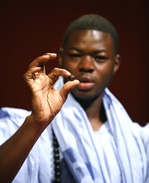SITE GUIDE
SEARCH
REVIEWS
REVIEW ARCHIVES
ADVERTISING AT CURTAINUP
FEATURES
NEWS
Etcetera and
Short Term Listings
LISTINGS
Broadway
Off-Broadway
NYC Restaurants
BOOKS and CDs
OTHER PLACES
Berkshires
London
California
New Jersey
DC
Connecticut
Philadelphia
Elsewhere
QUOTES
TKTS
PLAYWRIGHTS' ALBUMS
LETTERS TO EDITOR
FILM
LINKS
MISCELLANEOUS
Free Updates
Masthead
Writing for Us
A CurtainUp  London Review
London Review
 London Review
London Review11 and 12
by Tim Newns
|
If someone hits you and you hit back that is weakness. If someone hits you and you do nothing that is also weakness.— Tierno Bokar (Makram J. Khoury)
|

Tunji Lucas
(Photo: Pascal Victor ArtComArt) |
A basic yet fundamentally important story follows a French ruled colony in West Africa in early 20th Century. The local people are in dispute as to whether a certain prayer should be said 11 or 12 times. What follows is a lengthy debate as to the effects of intolerance and ignorance to other cultures and practices that inevitably lead to violence and further isolation.
Full of charm, Brook's production never strays from a gentle almost meditative state. We are never attacked or shocked into questioning the significance of what we see. We are gently rocked into submission, to perceive in a calm and intellectual manner. We very quickly understand that tolerance is the theme.
Brook's own style is a clear tool in testing our tolerance, as this is theatre that is beautifully slow and exact, and is not to be recommended for one who favours the more dramatic flair. It is to be highly recommended however, to any student of theatre. Brook displays the skeleton of the story telling process clearly. It is theatre in the making, theatre that perhaps will engage you on a more intellectual level than emotional but nevertheless manages to strike a resonant chord at the very core of our moral and to some extent, our religious beliefs.
In the vast, yet strangely intimate space of the Barbican Theatre, the representational set is the epitome of the barren, West African countryside. A square red cloth to show the deserted landscape is combined with warm and beautifully yellow lighting designed by Philippe Violatte that strongly invites us into the space.
Special mention must go to Brook's long time musical collaborator Toshi Tsuchitori who provides effective and rhythmic live backing music with a variety of curious and fascinating instruments some of which I am ashamed to not even know the origin of. It is a pleasure to watch him at work. The excellent cast are from a variety of backgrounds, they switch between playing different roles effortlessly and persuasively. Makram J. Khoury in particular plays a local "wise man" and religious tutor with deep humility and grace.
After the Barbican the production proceeds onto a National tour. With times as unpredictable and harsh as they are, this soft reflective production is the perfect therapeutic experience.
| 11 and 12
Adapted by Marie-Hélène Estienne Directed by Peter Brook Starring: Antonio Gil Martinez, Makram J. Khoury, Tunji Lucas, Jared McNeil, Khalifa Natour, Abdou Ouologuem, César Sarachu, Maximilien Seweryn. Lighting: Philippe Vialatte Music: Toshi Tsuchitori Running time: 90 minutes no interval Box Office: 020 7638 8891 Booking to 27th February 2010 then touring and finally at The Rose Kingston from 27th April to 1st May 2010 Co-commissioned by barbicanbite 10, London; C.I.C.T./Théãtre des Bouffes du Nord, Paris; The Grotowski Institute, Wroclaw Reviewed by Tim Newns based on 12th February performance at the Barbican Theatre, Barbican Centre, Silk Street, London, EC2Y 8DS. |
|
Subscribe to our FREE email updates with a note from editor Elyse Sommer about additions to the website -- with main page hot links to the latest features posted at our numerous locations. To subscribe,
E-mail: esommer@curtainup.comesommer@curtainup.com put SUBSCRIBE CURTAINUP EMAIL UPDATE in the subject line and your full name and email address in the body of the message -- if you can spare a minute, tell us how you came to CurtainUp and from what part of the country. REVIEW FEEDBACK Highlight one of the responses below and click "copy" or"CTRL+C"
Paste the highlighted text into the subject line (CTRL+ V): Feel free to add detailed comments in the body of the email . . . also the names and emails of any friends to whom you'd like us to forward a copy of this review. |




